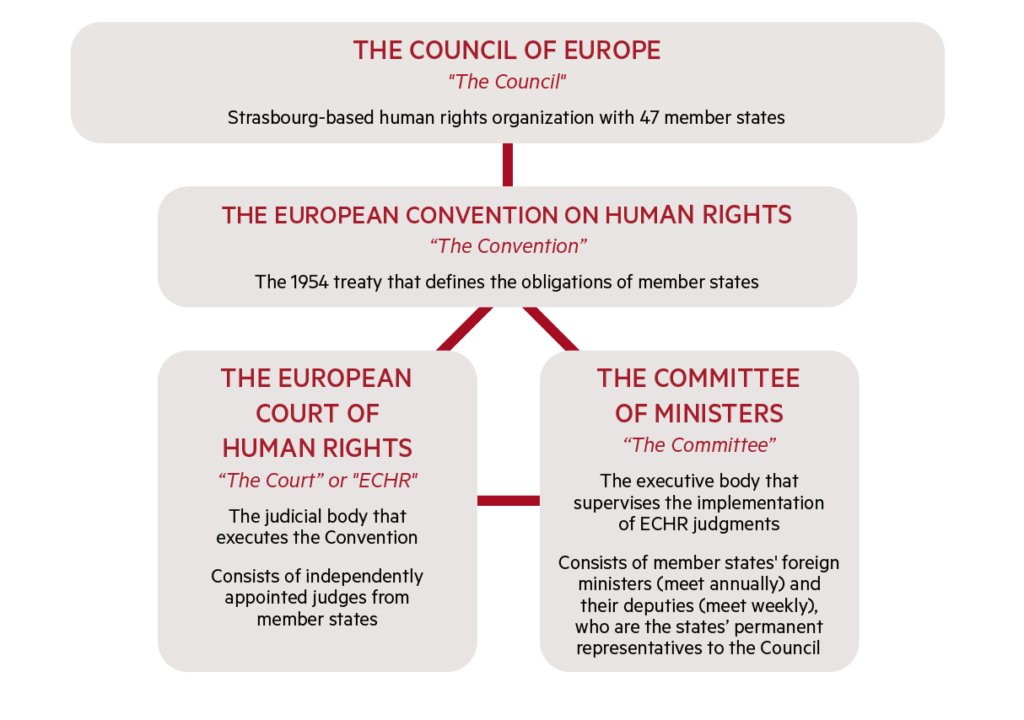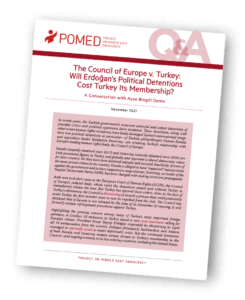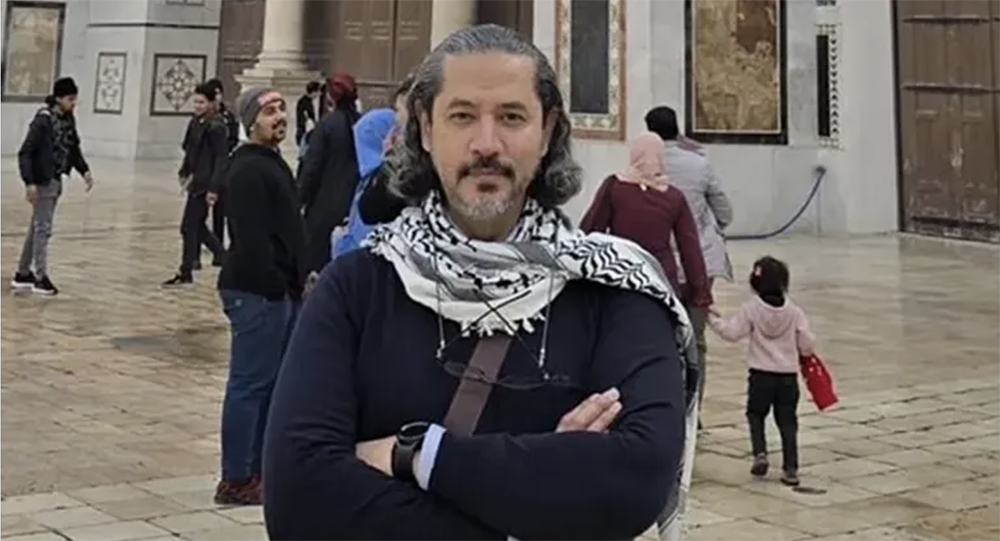In recent years, the Turkish government’s recurrent unlawful and unjust detentions of peaceful critics and political opponents have escalated. These detentions, along with other severe human rights violations, have badly damaged Turkey’s international image. Now two political detentions in particular—of Turkish philanthropist Osman Kavala and opposition leader Selahattin Demirtaş—are straining Turkey’s relationship with Europe’s leading human rights body, the Council of Europe.
Kavala (unjustly detained since 2017) and Demirtaş (unjustly detained since 2016) are both prominent figures in Turkey and globally and represent a liberal democratic vision for their country. Yet they have been detained unjustly and accused, baselessly, of some of the most serious crimes in the country. Kavala is alleged to have “organized” mass protests against the government and to have supported a coup attempt. Demirtaş, co-leader of the Peoples’ Democratic Party (HDP), has been charged with making terrorism propaganda.
Both men took their cases to the European Court of Human Rights (ECHR), the Council of Europe’s judicial body, which ruled the detentions unjust and ordered Turkey to immediately release the men. But Turkey has ignored these orders. Now, in the face of Turkey’s obstinance, the Council is threatening to launch a process that could potentially make Turkey the first member state to ever be expelled from the club. The Council has declared that if Kavala is not released by the time of its November 30 meeting, it will formally initiate infringement procedures against Turkey.
Highlighting the growing concern among many of Turkey’s most important foreign partners, in October, 10 embassies in Turkey issued a rare joint statement calling for Kavala’s release. President Recep Tayyip Erdoğan responded by threatening to expel all 10 ambassadors from the country. Erdoğan fortunately backtracked, and Ankara managed to narrowly avoid a major diplomatic crisis. But the continued detentions of both Kavala and Demirtaş remain serious threats to Turkey’s membership in the Council—and ongoing irritants in its ties with key countries, including the United States.
To explain the interplay between Turkey’s domestic human rights issues and what is unfolding at the Council of Europe, POMED’s Merve Tahiroğlu spoke with Turkish human rights lawyer Ayşe Bingöl Demir to unpack why and how the Kavala and Demirtaş cases came to threaten one of Turkey’s most important ties to Europe.
At the time of publication, both Kavala and Demirtaş remain behind bars.
POMED: Why is the Council of Europe important for Turkey?
Ayşe Bingöl Demir: The Council of Europe is one of the oldest and most important European institutions to which Turkey belongs. Turkey joined soon after the Council’s founding in 1949 and has been a party to the European Convention on Human Rights, the treaty that serves as the Council’s cornerstone, since 1954. As is obligatory for all member states, Turkey gave the Council’s judicial sub-body, the ECHR, jurisdiction to enforce the Convention in Turkey in 1990—meaning that, for more than 30 years, the Turkish government has legally recognized the ECHR’s judgments as binding for Turkish courts.

Why is the Council threatening to launch an infringement process against Turkey?
Turkey has notoriously failed to comply with two recent ECHR judgments, in open violation of its obligations as a member of the Council and as a party to the Convention. According to Article 46(4) of the Convention, this failure could be grounds for the Council to launch infringement proceedings against a member state, which could lead to that state’s suspension or even expulsion from the Council. While launching infringement proceedings is a drastic and rare step for the Council to take, the significance of the two ECHR judgments, coupled with the Court’s clear order for the applicants’ immediate release and with Turkey’s unresponsiveness to multiple calls for compliance, has left the Council with no other option.
The judgments in question concern the above-mentioned civil society leader Osman Kavala and politician Selahattin Demirtaş. In both cases, the ECHR ruled (in December 2019 for Kavala and December 2020 for Demirtaş) that in imprisoning them, Turkey violated several articles of the Convention—including Article 5, which describes what constitutes a “lawful” detention, and Article 18, which prohibits states from detaining people for political purposes. The ECHR usually allows member states themselves to determine what measures to take in order to comply with its judgments. But as Kavala and Demirtaş remained in prison when the ECHR issued its judgments, it instead directly ordered Turkey to take a first and most urgent step: to release both men immediately.
Turkey has not only ignored the ECHR’s orders, but it has also rebuffed all of the Council’s subsequent efforts to encourage compliance. In the nearly two years since the Kavala judgment, the Committee of Ministers—the body of the Council that monitors the implementation of ECHR judgments—has adopted seven “decisions” and an interim resolution calling for Kavala’s immediate release.[1] Yet Turkey has ignored these calls. Last June, the Committee told Turkey that if it did not release Kavala by the time of its September 2021 meeting, the Council would be “ready” to take the extraordinary step of initiating infringement proceedings. When Turkey again ignored the call, the Committee issued its final warning at its September meeting, stating its clear intention to serve formal notice to Turkey that it will commence infringement proceedings at its next meeting, November 30–December 2, 2021, if Turkey does not release Kavala by then.[2]
Although the September warning appears to be specifically related to the Kavala case, the Committee has demonstrated a similar approach to Turkey’s non-defiance of the ECHR’s order to release Demirtaş. The follow-up process for his case is at an earlier stage but no less important than Kavala’s.
How significant is this threat of infringement?
The warning delivered to Turkey in September is undoubtedly significant: Launching infringement procedures is one of the most severe measures the Committee can take against a member state. In its history, the Committee has initiated this process only once before, in December 2017, when Azerbaijan failed to abide by the Court’s 2014 order to release opposition politician Ilgar Mammadov. Azerbaijan ultimately complied with the release order, and the Committee closed the infringement proceedings in September 2020. That the Committee may soon take this most drastic of actions against Turkey indicates the flagrant nature of Turkey’s disregard for human rights and for the commitments it has made to other European states.
Why is it important for Turkey to abide by the ECHR’s judgments?
For three reasons. First, it is important for the enforcement of human rights on the international level. Let’s not forget that the Council of Europe is a human rights organization. It was established right after World War II in order to protect and promote human rights, democracy, and the rule of law across Europe. It created the European Convention on Human Rights for exactly this purpose, and it established the ECHR to enforce that Convention. This makes the ECHR one of the most important human rights oversight mechanisms in the world. The fact that the Court’s judgments are legally binding is the only way to ensure that member countries will “secure to everyone within their jurisdiction the rights and freedoms defined in the Convention” (Article 1). A member state’s failure to respect this promise would have serious negative consequences for international and domestic law as well as political and reputational implications for the member state.
A second reason is that following ECHR judgments is part of Turkey’s international treaty obligations—obligations that are enshrined in Turkish law. Article 90 of the Turkish Constitution states that domestic authorities, including the judicial, executive, and legislative branches of government, must respect international human rights treaties and duly implement their provisions. The Constitution says that where such international treaties conflict with domestic legislation, international treaties should prevail. Turkey’s failure to implement ECHR judgments, therefore, breaches a commitment to the European Convention that is guaranteed under Turkish law.
This brings us to the third point: More than anything, Turkey’s failure to respect the Convention’s human rights standards and to implement ECHR judgments hurts Turkey’s citizens. The current Turkish government likes to argue that Turkey’s international human rights obligations serve other countries’ interests or a foreign agenda. In fact, these obligations primarily serve the interests of those who live in Turkey or are under Turkey’s jurisdiction. The ECHR’s judgments against Turkey highlight serious underlying problems with the current state of rule of law and human rights in Turkey, including the lack of judicial independence and impartiality and the frequent executive interference in judicial processes. These judgments point to a host of systemic issues, such as torture, persistent impunity, violations against electoral rights, the unlawful and arbitrary use of criminal law, and undue interference with freedom of expression, association, religion, and peaceful assembly. These very serious issues imperil the people of Turkey’s access to fundamental rights and freedoms.
Are the Kavala and Demirtaş cases the only examples of Turkey’s non-compliance with the ECHR?
No, these two cases are just the tip of the iceberg. The ECHR has delivered more judgments against Turkey than against any other member state. According to the Court’s statistics covering the period between 1959 and 2020, out of 23,406 total judgments the Court made against 47 member states, 3,742 were against Turkey, compared to 2,884 against second-placed Russia and 2,427 against Italy in third place.[3]
The Committee of Ministers’ statistics, meanwhile, show that Turkey is not only a constant violator of the Convention but also ranks among the top three Council of Europe member states (together with Russia and Ukraine) in terms of non-compliance with the ECHR’s judgments. In 2020, the Committee said that it had 624 ECHR judgments against Turkey still awaiting implementation.[4]
While the Committee’s monitoring of compliance with these judgments is ongoing, not all 624 warrant launching an infringement proceeding. The Convention designates infringement as a measure to be applied as a last resort and “only in exceptional circumstances.” The Committee’s practice suggests that a state’s deprivation of someone’s liberty for political purposes and persistent refusal to end such unlawful detentions are considered “exceptional circumstances.”
So are we seeing a new phase in Turkey’s relations with the Council of Europe?
Turkey’s human rights record, and therefore its relationship with the Council of Europe institutions overseeing compliance with human rights, has always been problematic. The depth of the current antagonism between Turkey and the Council, however, is new, and strongly related to the current political climate in Turkey. In particular, it reflects the severe decay in human rights and the rule of law in Turkey since the 2016 coup attempt and the subsequent imposition of a two-year state of emergency. The ECHR was initially reluctant to take on this challenge. But as the failure of Turkey’s domestic mechanisms to properly address and remedy systemic rights violations became clear, the Court began to deliver highly critical judgments. And the Committee of Ministers began to take more robust steps to enforce those judgments. So this can surely be referred to as a new phase in Turkey’s relations with the Council of Europe.
The Kavala and Demirtaş judgments, for example, are the first two ECHR judgments to find Article 18 violations against Turkey—meaning that Turkey has for the first time been found to have carried out politically motivated detentions. This is a very serious violation that raises major questions about the state of the rule of law and human rights in the country. Indeed, because of this gravity, the ECHR rarely hands down Article 18 violations.[5]
As such judgments address serious structural human rights and rule of law issues, supervising their implementation is also difficult, since it depends heavily on the political climate in the country in question. Not surprisingly, the current government in Turkey has not received the ECHR’s judgments and the Council’s actions well. It has resisted taking the most obvious and necessary steps to implement the judgments—releasing Kavala and Demirtaş.
Indeed, the Turkish government has adopted an increasingly dangerous discourse aimed at manipulating public perception of the Council of Europe and of Turkey’s international commitments. The government has falsely argued that the Court’s judgments are not binding, instead calling them advisory in nature and politically motivated. Government officials also allege that they cannot tell Turkey’s “independent” courts what to do. Meanwhile, under the influence—if not full control—of the executive, Turkish judicial and prosecutorial authorities have been adopting evasive tactics to avoid implementing the ECHR judgments. One such tactic has been to change the grounds for Kavala’s and Demirtaş’s detentions on paper in an attempt to nullify the ECHR orders on the basis that the judgments no longer conform to the cases.[6]
All in all, Turkey and the Council of Europe have a fundamental difference in their approach to human rights. Whether and how this difference will be resolved is unclear. The ongoing detention of Demirtaş and the Turkish court’s refusal to release Kavala yet again at his October 8 court hearing suggest that Turkey is unlikely to heed the Council’s exhortations anytime soon. Indeed, President Erdoğan’s threat to expel the 10 foreign ambassadors who, echoing the ECHR, called for Kavala’s release in October, was a further indication of Turkey’s obstinance on the Kavala matter.
So if an infringement process happens, what would it look like?
The Committee of Ministers clearly stated in September that it will take steps to trigger infringement proceedings at its next meeting if Kavala is not released by then: That gives Turkey until November 30. Under the Turkish criminal procedure law, detention of suspects or accused can be reviewed at any time. Turkey could also use Kavala’s upcoming court hearing on November 26 as an opportunity to release him. In Turkey’s current political climate, however, this possibility appears unlikely.
The infringement proceedings are rather bureaucratic and will require a number of steps. The first step, according to the Convention and the Committee’s own rules, will be to formally notify Turkey of the Committee’s intention to ask the ECHR to officially confirm whether Turkey has been complying with judgments while inviting Turkey to submit its own opinion on the issue. The Committee will likely take this step by adopting a resolution during or shortly after its November 30–December 2 meeting. In this resolution, it will ask Turkey to submit its “views on the matter” by the time of the Committee’s subsequent meeting, which should occur in March 2022.
Once Turkey has submitted its opinion, the next step is for the Committee to pass another resolution that presents that opinion and formally asks the ECHR to assess Turkey’s compliance. The ECHR will then evaluate the matter and submit its response to the Committee. If the ECHR confirms Turkey’s non-compliance and Turkey insists on continuing Kavala’s unlawful detention, the Committee will have to apply more robust measures such as suspending Turkey’s membership in, or even expelling it from, the Council of Europe.
The Council of Europe’s statute clearly states that the member states must uphold rule of law and human rights principles. They also must genuinely and effectively collaborate with the Council’s bodies to achieve the Council’s goals. Under Article 8, if a country seriously violates these commitments, its representation can be suspended and the Committee of Ministers can ask it to withdraw from the Council. If the country does not comply, the Committee could decide to expel the country. (Throughout this process, the other bodies of the Council, particularly the Parliamentary Assembly, must be consulted.)[7]
So, the process is rather slow and relies heavily on a system of high-level diplomacy and peer review. But given the significant legal and political ramifications, countries like Turkey have every incentive to try to avoid facing an infringement procedure.
What lessons can the international community draw from Turkey’s current standoff with the Council of Europe and the process that has led to it?
The backsliding in democratic, human rights, and rule of law standards in Turkey has been underway for a long time. The government’s actions suggest that there is no political will to change the structural issues generating systemic and gross rights violations or to take actions to comply with its international obligations. If the international community does not pay due attention and take action accordingly, this decay is likely to deepen.
First and foremost, states and international institutions must base their political and financial relationships with Turkey on human rights. They must remember that Turkey is part of a larger trend of rising authoritarianism across Europe and that what happens inside Turkey—and between Turkey and the international community—has an impact beyond the country’s borders. States must assess this impact and be more vocal, specific, and consistent in their criticism and demands from Turkey, making it clear that the Turkish government will face profound consequences if it continues with policies that severely depart from fundamental democratic standards.
Such a firm approach will have serious implications for Turkey and has the potential to help improve the Turkish government’s future policies on human rights. I cannot emphasize enough that for people in Turkey and their struggle for a more democratic country, tailored pressure from the international community is a very meaningful form of support. Institutions like the Council of Europe, as well as Turkey’s democratic allies, have a responsibility to support this struggle for a Turkey that is governed by the rule of law and that respects, protects, and promotes human rights.
Ayşe Bingöl Demir is a lawyer and co-director at the London-based Turkey Human Rights Litigation Support Project. Specializing in international human rights law and domestic law and judicial procedures in Turkey, she worked as a lawyer in Istanbul between 2003 and 2017 and as part of the legal team at the London-based Media Legal Defence Initiative until 2019. Ayşe was a research fellow at the Middlesex University’s School of Law between 2017 and 2020. Currently based in New York, she acts as a consultant and country expert for several national and international civil society organisations. She is on Twitter @aysebingoldemir.
Merve Tahiroğlu is POMED’s Turkey program coordinator. She is on Twitter @MerveTahiroglu.
NOTES
1. H46-38 Mergen and Others (Application No. 44062/09) and Kavala (Application No. 28749/18) v. Turkey (Committee of Ministers, Council of Europe, September 3, 2020), https://search.coe.int/cm/Pages/result_details.aspx?ObjectID=09000016809f62cd,
H46-22 Kavala v. Turkey (Application No. 28749/18) (Committee of Ministers, Council of Europe, October 1, 2020), https://search.coe.int/cm/Pages/result_details.aspx?ObjectId=09000016809fa93f,
Interim Resolution CM/ResDH(2020)361 Execution of the judgment of the European Court of Human Rights Kavala against Turkey, (Committee of Ministers, Council of Europe, December 3, 2020), https://search.coe.int/cm/Pages/result_details.aspx?ObjectID=0900001680a09786,
H46-33 Kavala v. Turkey (Application No. 28749/18), (Committee of Ministers, Council of Europe, March 11, 2021), https://search.coe.int/cm/Pages/result_details.aspx?ObjectID=0900001680a1b371,
H46-1 Kavala v. Turkey (Application No. 28749/18): situation of the applicant, (Committee of Ministers, Council of Europe, April 15, 2021), https://search.coe.int/cm/Pages/result_details.aspx?ObjectID=0900001680a21dbd,
H46-1 Kavala c. Turquie (Requête n° 28749/18) : situation du requérant, (Committee of Ministers, Council of Europe, May 12, 2021), https://search.coe.int/cm/Pages/result_details.aspx?ObjectID=0900001680a26d17,
H46-31 Kavala v. Turkey (Application No. 28749/18), (Committee of Ministers, Council of Europe, June 9, 2021), https://search.coe.int/cm/Pages/result_details.aspx?ObjectID=0900001680a2c10e,
H46-37 Kavala (Application No. 28749/18) and Mergen and Others group (Application No. 44062/09) v. Turkey, (Committee of Ministers, Council of Europe, September 16, 2021), https://search.coe.int/cm/Pages/result_details.aspx?ObjectID=0900001680a3c4d0
2. For a detailed analysis of the procedure before the Committee of Ministers in relation to the Kavala and Demirtaş judgments, see Başak Çalı, “Remedies for Bad Faith Violations Turkey’s Contribution to the Article 18 Remedy Jurisprudence of the Committee of Ministers of the Council of Europe,” October 13, 2021, Voelkerrechtsblog, https://voelkerrechtsblog.org/remedies-for-bad-faith-violations/
3. “The ECHR in Facts & Figures 2020,” The European Court of Human Rights, February 2021, https://www.echr.coe.int/Documents/Facts_Figures_2020_ENG.pdf
4. “Supervision of the Execution of Judgments and Decisions of the European Court of Human Rights 2020”, 14th Annual Report of the Committee of Ministers, p. 47, https://rm.coe.int/2020-cm-annual-report-eng/1680a1f4e8
5. For a comprehensive evaluation of the ECHR’s Article 18 jurisprudence and the challenges of the judgment implementation supervision process see Başak Çalı, “How Loud Do the Alarm Bells Toll? Execution of ‘Article 18 Judgments’ of the European Court of Human Rights,” August 16, 2021, https://brill.com/view/journals/eclr/2/2/article-p274_274.xml
6. “Turkey’s ‘evasive judicial tactics’ to circumvent its obligation to implement the ECtHR’s Selahattin Demirtaş and Osman Kavala judgments,” Turkey Human Rights Litigation Support Project, September 2021, https://www.einnetwork.org/s/Execution-of-the-Demirtas-and-Kavala-judgments-and-Turkeys-judicial-tactics.pdf
For comprehensive analysis of the developments in the cases in light of the Court’s judgments and Turkey’s obligation to implement them, see the submissions by the Turkey Human Rights Litigation Support Project, Human Rights Watch, and the International Commission of Jurists to the Committee of Ministers in relation to Osman Kavala judgment implementation process: (1) The submission on 29 May 2020: http://hudoc.exec.coe.int/ENG?i=DH-DD(2020)501E; (2) The submission on 2 November 2020: http://hudoc.exec.coe.int/ENG?i=DH-DD(2020)1007E; (3) The submission on 7 February 2021: http://hudoc.exec.coe.int/ENG?i=DH-DD(2021)186E; (4) The submission on 18 August 2021: http://hudoc.exec.coe.int/ENG?i=DH-DD(2021)836E; and the submissions made by the Turkey Human Rights Litigation Support project, ARTICLE 19, the International Federation for Human Rights, Human Rights Watch and the International Commission of Jurists in relation to Selahattin Demirtaş judgment implementation process: (1) The submission on 7 February 2021: http://hudoc.exec.coe.int/ENG?i=DH-DD(2021)192revE and 2) The submission on 23 July 2021: http://hudoc.exec.coe.int/ENG?i=DH-DD(2021)759E.
7. For more details about this process, see Kanstantsin Dzehtsiarou and Donal K Coffey, “Suspension and Expulsion of Members of the Council of Europe: Difficult Decisions in Troubled Times,” International and Comparative Law Quarterly 68, no. 2 (2019): 443-76. (Cambridge University Press, 17 April 2019), https://www.cambridge.org/core/journals/international-and-comparative-law-quarterly/article/suspension-and-expulsion-of-members-of-the-council-of-europe-difficult-decisions-in-troubled-times/0CA9AC93A5722D91BECC4391D93B654E






